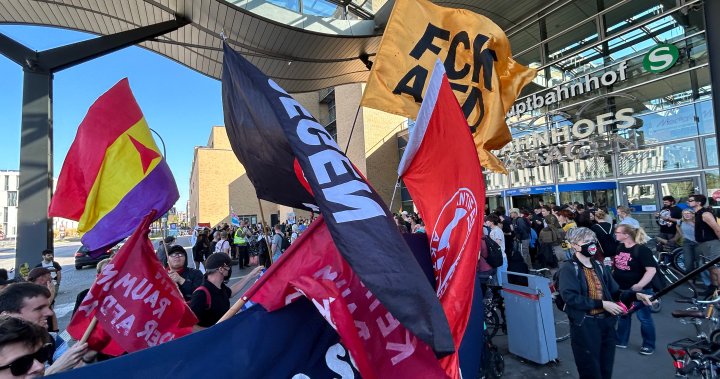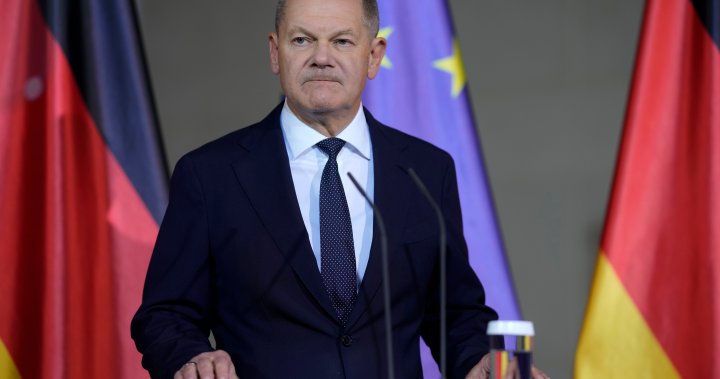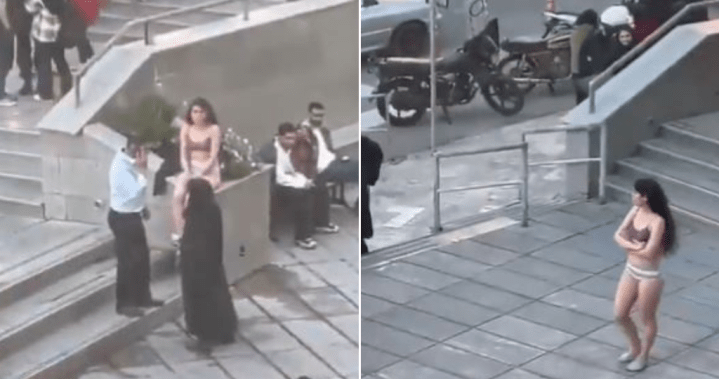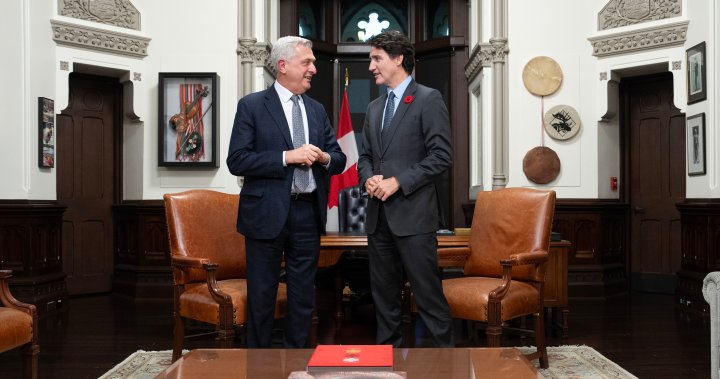The rise of the far right in Germany and how division remains a common theme – Montreal

In beautiful historic Potsdam on election day, warm rays of sun pirouette across the roofs and walls of the majestic buildings once home to Prussian royalty.
But in the sunshine, shadows of a far-right past emerge.
This is the same city where Germany was divided by the allies after the Second World War. Nearly 80 years later, division is still the theme of the day.
Traces of unrest are everywhere.
Slogans condemning the far-right Alternative for Germany party (AfD) are plastered on stickers on the rail of a pedestrian bridge and scribbled in chalk on a bike path.
Red paint is splashed over AfD election posters. The message from leftist activists is clear: we don’t want you here.
As voters head to the polls for the Brandenburg state elections, a swelling protest against AfD greeted train users at the Potsdam Hauptbahnhof.
The rallies were organized by the Geradedenke Kollektiv, a coalition of self-described leftist groups.
“Against nazis”, “No room for the AfD” and “F*ck the AfD” were some of the popular slogans for posters, flags and signs.
Protesters held back by police officers outside of the AfD headquarters.
Gloria Henriquez/Global News
“They are not welcome here,” clearly stated Christian Mast, one of the organizers with Geradedenke Kollektiv, whose tagline is “a pro-science, anti-populism, anti-right wing, anti-conspiracy theories collective.”
Mast says the AfD is a populist party that aims to deny the rights of Germans and rewind the clock on years of progressive policies.
“The AfD is presenting an image or an idea of a society that is coming straight from 50, 60 years ago. They stand for values like traditional marriages, that there are only two genders and denying the whole existence of queer people,” Mast explained.
While that idea of society doesn’t sit well with Mast and those protesting, one in five Germans sympathize with the AfD and its policies, according to the Pew Research centre, a nonpartisan American think tank based in Washington, D.C.
Historian and journalist Katja Hoyer explains the AfD’s appeal in part because it’s filling a political void.
Hoyer is the author of Beyond the Wall, a history book about life in socialist East Germany, where she grew up.
“Under Angela Merkel the Christian Democratic Union of Germany (CDU) moved so far into the middle, maybe even centre-left that it left a huge vacuum on the right hand side of the political spectrum and so, if people had concerns or were sort of conservative on the social sense, they often felt like they had nowhere to go with that,” Hoyer explained.
The AfD headquarters on the day of the Brandenburg state election on Sunday Sept. 22, 2024.
Gloria Henriquez/Global News
Hoyer adds many Germans also resented Merkel’s open border migration policy that welcomed over 1 million refugees fleeing Iraq, Syria and Afghanistan in 2015.
“We will manage this,” Merkel famously proclaimed at the time.
AfD supporters such as Corinna Carriere think the country in fact, didn’t manage the refugee crisis appropriately and Germans like her are now paying for it.
Born and raised near Stuttgart, Carriere is the daughter of Italian immigrants.
“They came to [Germany] to work,” she said. “We have a lot of immigrants who come here for the money and they don’t want to work anymore.”
Germany’s unemployment rate was six per cent for September 2024, according to the country’s statistics office.
Carriere is self-employed. She is a tattoo artist and ran for the AfD as a city councillor in Potsdam.
She says she got involved to preserve the Germany she grew up in for her two teenage daughters. She feels like the left doesn’t allow for other opinions in Germany.
“Germany is like the Titanic. And with the current parties, we will sink. We need a change and we have only the AfD for this change,” Carriere said.
Part of the AfD’s party platform as outlined in their manifesto, includes promoting “German as Predominant Culture instead of Multiculturalism.” This includes a clause on Islam “not belonging to Germany.”
“Its expansion and the ever-increasing number of Muslims in the country are viewed by the AfD as a danger to our state, our society, and our values,” reads part of the AfD manifesto.
A photographer takes a shot of vandalized campaign posters in the German city of Potsdam on the day of the Brandenburg state election day on Sept. 22, 2024.
Gloria Henriquez/Global News
According to Germany’s Federal Ministry of the Interior, a study conducted in 2020 shows that roughly 4.5 million Muslims live in Germany, accounting for about 5.5 per cent of the population.

Get breaking National news
For news impacting Canada and around the world, sign up for breaking news alerts delivered directly to you when they happen.
The manifesto also calls for massive “repatriation” of immigrants, a stop to the use of gender-neutral terminology and it opposes abortion “as a human right,” among other things.
While Carriere deems those policies necessary to preserve her idea of Germany, Mast believes they threaten the very foundation of the country that he knows and loves.
“Especially taking into consideration German history, it’s a super big achievement — there is still a way to go in many parts — but that kind of society actually brings a lot of good things and nice ways to live your life in freedom… that is something we for sure want to keep and the AfD works against,” Mast said.
Because of Germany’s history with Nazism, Mast says they’ve seen how far things can go.
That’s why they are more sensitive and react more vehemently against the AfD’s policies, which they consider fascist, he said.
To make their voices heard by the AfD, the Kollektiv traveled to the party’s headquarters, located a 20-minute bus ride outside of the city centre.
Global News was on a bus as it was stopped and inspected by police officers before it entered the road where party supporters were located. Officers asked people why they were heading into the area.
That’s where Mast and Carriere met: divided not only by their views but by barricades and dozens of police officers.
Carriere was standing just outside the venue, watching the throng of opponents lead by Mast yell in protest of her party’s presence. She disagrees with their tactics.
“We want to talk with everybody,” she said. “But they don’t want to talk with us. Why?”
She listened to them chant and wave a flag that read “against Nazis.”
“That’s so stupid,” she said. “What is happening here in Germany is really what happened in this time [Nazism] but not from the AfD but the other parties. They try to shut other peoples’ mouths who have a different opinion.”
Voters outside of polling stations who Global News spoke to argue AfD supporters’ opinions can be damaging to society.
It’s why many came out to protest against the party by casting a ballot, including Evelyn Reimer, the daughter of Russian immigrants.
She sees the AfD’s immigration policy as problematic.
“I just see the danger in the refugee topic. They try to build up more hate against people who are not from Germany,” Reimer said.
“I’m really happy that my family came here and I also have friends who come from Syria. I don’t want these negative thoughts about people who are not from Germany.”

Reimer, who is also a Christian, says the party confers conservative, religious meanings to their campaign slogans and promises but none of that aligns with actual Christian values. “I don’t trust that anything that they say is true,” Reimer said.
Alexander Probst, a university student in Potsdam also came out to vote against the AfD.
“The AfD is more present than other parties on TikTok,” said Probst, who added he consumes a lot of political content on the platform. “They simplify things a lot.”
Probst says he doesn’t believe the content the AfD spreads on social media. But other young people do.
“You can easily see who actually has knowledge about politics and who is just spreading hate,” Probst said.
Jakob Franke, a doctor in medicine in Potsdam said this election was important for him to combat the rise of the party. He doesn’t want Germany to be associated with a far-right party ever again.
“That’s an image that we can’t go back to, historically speaking,” Franke said.
According to final results published by the state electoral administration, the AfD came a close second with 29.2 per cent of the vote. The party in power, the Social Democratic Party of Germany (SPD), managed to narrowly clinch another term, capturing 30.9 per cent of the votes.
Tension was high among SPD supporters because the AfD had previously earned a victory in the Thuringia state elections. It was the far right’s first win in a state parliament election. Coming into the vote in Brandenburg, the AfD led in some polls.
It wasn’t the result Dominik Asch was hoping for.
He gave his first vote to the party when he was 18 years old. But when the COVID-19 pandemic hit, he says he enrolled as a member. He was vice-chairman for the AfD’s youth wing in the West-German state of Hesse.
Now 27 years old, he is practicing to become a roof plumber.
“It was not acceptable how the government imposed sanctions on those who would not vaccinate themselves, like myself,” Asch said. “That’s why there was only one option, to join the AfD.”
“Wokeness is taking place in our everyday lives, especially the parties on the left side are encouraging it.”
AfD supporters, including Dominick Asch (right) on Sept. 22, 2024.
Gloria Henriquez/Global News
He deplored immigration, especially illegal immigration, gender studies and inflation.
“The governing parties can’t understand the small man who has to face prices becoming higher and fearing to lose their status in their society,” Asch said, as other members of the youth wing were singing outside.
The lyrics of the song that was belted out: “Hey, now it’s happening, deport them all!”
One person held a sign that read “deport millions.”
Germany’s Federal Office for the Protection of the Constitution (BfV) — the government’s domestic intelligence service — classified the AfD’s youth wing as a “confirmed extremist threat,” according to the service.
The group disputed the classification in court but lost, upholding the office’s right to continue labeling the organization as extremist and monitor its activities, as reported by Reuters back in May.
Asch’s name was also mentioned in an investigative piece by Germany’s Der Spiegel magazine about a secret meeting organized by the AfD’s youth wing allegedly attended by a former neo-nazi, according to the article.
When asked about it, Asch brushed it off.
“The intentions we have for Germany are not to abolish democracy, but get democracy back into people’s lives, to actively take everyone in in making decisions democracy stands for,” Asch said.
Protest against the AfD outside of the Potsdam train station in the state of Brandenburg.
Gloria Henriquez/Global News
To those who call the AfD Nazis and fascists, Asch says they are barking up the wrong tree.
“We are in no way the enemy of society, of the country, of the state,” Asch said.
He says people who are voting for the AfD are people who have felt abandoned by other political parties and are saying “enough.”
Hoyer says that the CDU is trying to win back votes the AfD took by clawing back the centre-right position, but people in the East, where the AfD is strongest, are wary, she says.
“They feel ‘I don’t really know what I’m getting with the CDU whilst if I vote for the AfD the message is very, very clear with what I want and what will happen’,” Hoyer said.
“People think there’s a centre-left, left-green consensus amongst politicians and people that are the CEOs of large companies and stakeholders in society”.
For example, Edeka, a large grocery chain, published a full page advertisement on several newspapers ahead of the Saxony, Thuringia and Brandenburg state elections, saying why “Blue is not an option at Edeka”, making allusion to AfD’s blue party colour.
It later apologized.
The AfD has faced opposition since its inception, even when it originally leaned neo-liberal and was created to oppose currency union within the European Union, Hoyer says.
“Even then people called them Nazis and far-right,” Hoyer explained. “I think because of that, if you start calling people Nazis and fascists and all the rest of it, there’s really nothing to stop these parties and their voters from then actually radicalizing and going further to the right, because they’ve already been branded with that label and they already feel ostracized and not heard and it becomes almost like a gleeful thing to play with that and to provoke with that.”
The AfD’s stronghold is not exclusive to the East. Support for the party has also been growing in West Germany, which historically tends to vote centre-right, centre-left.
In the European elections, the AfD finished second behind the CDU.
“I think that the most sensible way forward isn’t so focused on the East-West dimension as on economic and social issues and wondering how you can get back from that,” Hoyer said.
Voters came out to cast their ballot in Potsdam in the state of Brandenburg on election day.
Gloria Henriquez/Global News
Hoyer says German parliament is homogenous, with most of its members academics.
“It’s about asking why that is and seeing what political parties do to recruit in a more diverse fashion, from different political and economic strata,” Hoyer said.
She believes it would help politicians better understand people’s problems.
“There’s a breakdown in communication at the moment with people when they see very large problems on their doorstep and they just wonder why politicians just don’t get what the issue is. Having a bit more social and economic diversity would help,” Hoyer said.
It starts with leaders people can believe in, Hoyer states.
“People don’t want demagogues or people shouting platitudes at them, they want pragmatic leaders who look like they care about their job,” Hoyer added.
This was perhaps the statement made by voters in Potsdam on election day that sunny Sunday, who gave the SPD’s Dietmar Woidke another term, after 11 years in power.
Hoyer says people in the state of Brandenburg like him because he listens.
But it’s clear that with a narrow win against the AfD, not everybody feels heard.
Gloria Henriquez is in Germany as part of the Arthur F. Burns fellowship program.








